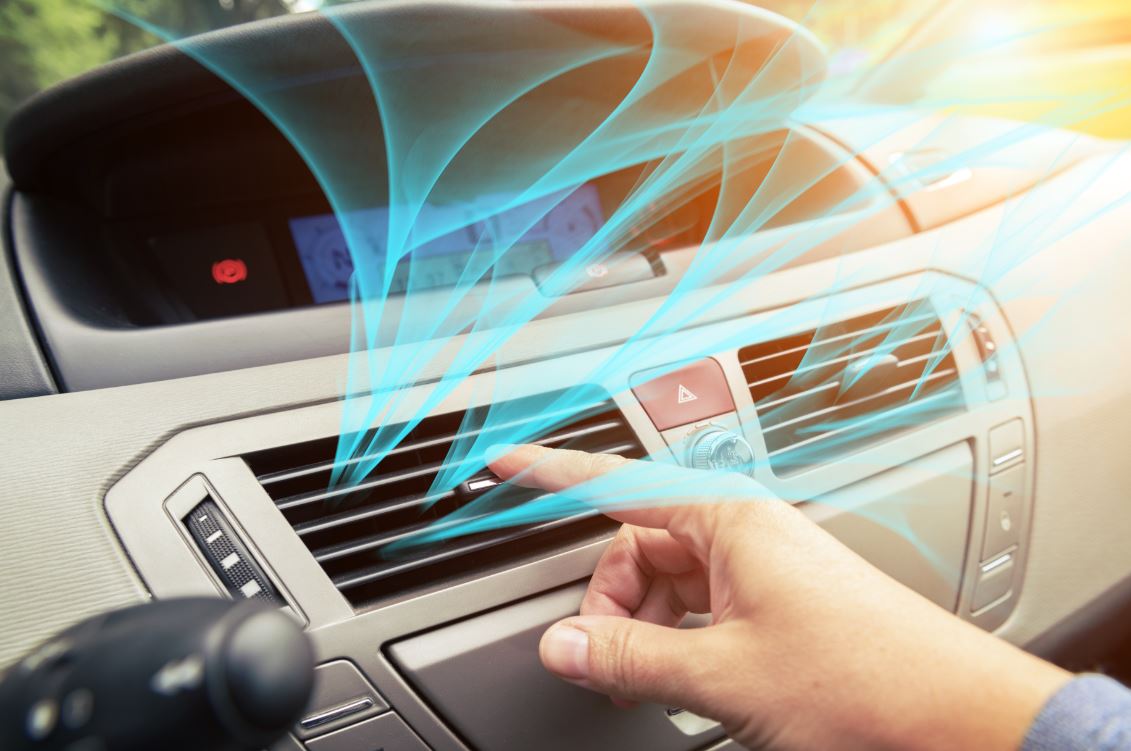How Does Car Air Conditioning Work?

There’s nothing quite like the feeling of hopping into your car on a hot summer day, turning on the air conditioning, and blasting that cold air! But have you ever wondered what makes your air conditioner work so efficiently? How does it transform your car from feeling like an oven to feeling like a refrigerator?
At Christian Brothers Automotive, we are here to help you understand exactly that. Today, we look closer at how car air conditioning systems work, the parts that make it possible, and frequently asked questions we hear the most from our customers. Let’s start with how the AC systems work.
How Does Car Air Conditioning Work?
Like your home's AC, car air conditioning systems use refrigerant gas to absorb heat from the air inside your car. The refrigerant is compressed into a high-pressure gas, which is then cooled in the condenser coil at the front of your car. This causes it to turn into a liquid that flows through an expansion valve and into the evaporator coil inside your car.
As the warm air from inside your car passes over the cold evaporator coil, the refrigerant absorbs the heat. The cooled air is then blown back into your car through the vents. Meanwhile, the refrigerant turns back into a gas due to the temperature exchange, and hot refrigerant gas is sent back to the compressor to start the process all over again.
Now that we’ve taken a quick, high-level look at how the air conditioning system works, let’s now discuss the parts that make this process possible.
Car Air Conditioner Parts & Functions
Understanding what parts make up your car's air conditioning and how they work together is always helpful in pinpointing any AC issues you may be experiencing. Here are some common parts of the AC system to familiarize yourself with:
Refrigerant – Although refrigerant isn't considered a "component" of your vehicle system, its impact on the overall performance is undeniable. At lower temperatures and pressures, it exists as a gas while becoming liquid under more extreme conditions, allowing heat removal from the air conditioning system. To maintain optimal results and keep your car cool,it must be filled to an exact amount.
Compressor – At the core of an AC system lies the compressor. It’s perfectly named, because it compresses the low-pressure gas into high-pressure, hot gas and pumps it to the other parts of your AC system.
Condenser – This part is located at the front of your radiator. The AC condenser takes the heat the refrigerant absorbs from inside the car and releases it outside the car. It passes hot refrigerant gas through a series of tubes and fins, dissipating its heat and turning into a cooler, high-pressure liquid ready for circulation.
Receiver – Before entering the evaporator, your system's receiver eliminates any remaining moisture from the refrigerant and stores it. The receiver ensures that only pure vapor is sent into the evaporator for optimal cooling performance. This is how you’re able to eliminate that sticky humidity from your car’s interior.
Evaporator – Tucked away underneath the dashboard, you'll find a radiator-like device with fins and tubes. This is the evaporator, which cools the hot air from your car by absorbing heat through the refrigerant. The cold air then circulates back into your vehicle via vents.
Expansion Valve – Last but certainly not least, this valve permits the high-pressure liquid refrigerant from the receiver to expand. When it expands, its pressure is reduced. It’s similar to a pressure cooker. Once your food is finished cooking, you move the lever to release the pressure and see a ton of steam shoot straight toward the ceiling. That lever is like the expansion valve.
With your new understanding of how car air conditioning works, you'll be able to better appreciate your AC's performance, and, perhaps, you’ll have a better understanding of what is causing any issues you may be having. Speaking of issues, we receive a lot of cars with AC problems, and this initiates many conversations with customers who have a lot of questions. Let’s look at what most people are asking.
Frequently Asked Questions About Car Air Conditioners
Aside from being asked how car air conditioning works, we regularly receive many other questions from customers. Here are some of the most popular FAQs:
Where Does the Car AC Get Air From?
While your AC's recirculation mode recycles the air already present in your car, it typically pulls fresh air from outside when you don't have it on. It uses its air intake system located in the front of the car, usually at the base of the windshield.
Does Using the Car AC Consume Fuel?
Using the car's AC system does consume fuel, but the amount is typically minimal. The AC compressor is powered by the engine, which requires some fuel to operate. However, modern cars are designed to be more efficient and have systems that minimize fuel consumption while cooling down your car.
How Can I Troubleshoot My Car Air Conditioner?
To begin troubleshooting anycommon air conditioning problem with your car, check the fuses and relays, inspect your refrigerant level, and ensure the air intake is not clogged. If these steps don't work, seek professional help to diagnose and repair the issue.
How Can I Clean My Car Air Conditioner?
Cleaning your car's air conditioner is important to maintain its efficiency and prevent unpleasant odors. Here are some ways you can keep things clean:
Check and replace the air filter if needed
Use a specialized cleaning spray to clean the evaporator coils if dirty
Vacuum dust from vents and the interior of the car
Consider using a cleaning spray to disinfect the system from inside the cabin and eliminate bad smells
It's recommended to clean your car's air conditioner at least once a year or more frequently, depending on usage and environmental factors. If you're uncomfortable doing it yourself, seek the help of a professional mechanic for thorough cleaning and maintenance.
How Often Should I Have My Car Air Conditioner Serviced?
Scheduling regular maintenance, at least once a year, for your car's air conditioner is important in ensuring safety, comfort, and ease when on the road. This time frame allows any small issues to be detected before they become bigger problems. As always, be sure to consult the manufacturer's user manual for the best advice regarding service intervals specific to your vehicle’s make and model.
Schedule Your AC Repair with Christian Brothers Automotive
AtChristian Brothers Automotive, we use advanced diagnostic technologies to identify and solve issues. Our experienced, expert technicians offer exhaustive AC services, which includes refrigerant recharging, condenser replacement, tube fixing, air filter cleaning or replacement, and much more. Trust us to handle all yourAC system and repair needs with honest, transparent, and joyful service!
Find your closest Christian Brothers Automotive auto repair shop and schedule your AC service appointment today to keep your car cool and safe! Ensuring that you’re driving with cold AC is how we are Driving Joy.

[1].jpg)
sunwash-tech-with-customer.png)

